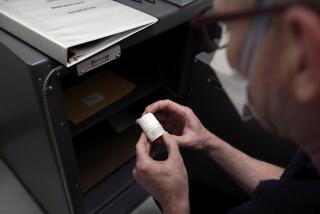Condom Industry Seeking Limits on U.S. Study
- Share via
The condom industry has launched an intensive campaign to weaken, delay or possibly shut down a federally funded Los Angeles study of the effectiveness of condoms in preventing transmission of the AIDS virus.
The industry’s trade group, the Health Industry Manufacturers Assn., has also suggested that its own “condom task force”--made up exclusively of executives of prophylactic manufacturers--play a major role in designing the upcoming study.
Among other things, the association has insisted to federal funding officials that the research rely solely on testing standards established by condom makers, that condom companies be allowed to supply all prophylactics to be tested, and that only products currently sold in the United States be studied.
And in at least one draft of a letter last May to top Washington officials of the National Institute on Child Health and Human Development, Norman Estrin, vice president of the trade group, concluded that “we urgently request that you issue a ‘stop-work order’ ” shutting down the UCLA-USC condom project.
The research has taken on a new element of urgency in the wake of a series of questions raised about the ability of condoms to reliably prevent the spread of human immunodeficiency virus (HIV).
The association’s effort, which government officials characterized as a rare industry pressure campaign directed at a federally-funded university research program, was detailed in a series of letters and other documents among the trade group, the government agency and UCLA. Copies of the correspondence, which has not been publicly released, were obtained by The Times.
The documents indicate that the attempt to force major modifications in the condom study was apparently motivated by industry concerns that the research might conclude that no American-made condom is currently able to consistently prevent the spread of HIV.
Dr. Roger Detels, the UCLA researcher who is principal investigator for the study, declined to discuss the situation, although, in a letter to the trade group in May, he termed its major demand “entirely unacceptable.”
Government officials and other sources involved in the research confirmed that the federal health institute and UCLA and USC scientists have faced repeated industry pressure to weaken the research design of the project, which is being supported by $2.5 million infederal funds. The institute has scheduled a meeting in Bethesda, Md., the week of Sept. 21 to discuss the situation with government and private condom-research experts.
Paul Duska, the government contract officer overseeing the research, characterized the industry pressure as “rather unusual.”
Estrin of the industry group denied Thursday that the association’s activities were intended to shut down or even delay the UCLA-USC study. However, he said, “our feeling was that our comments should be taken care of at the earliest possible (moment) . . . and that if this meant holding up the study until that could be done, then they (government officials) should consider it.”
He emphatically denied the industry had mounted a pressure campaign. “That’s completely untrue,” he insisted. “We’re 100% in favor of the goals of the study. I don’t view this as a dispute. I view this as us providing scientific input. Don’t come away with the impression that we’re trying to slow down this study.”
The UCLA-USC researchers hope to identify the safest condoms on the market and, if those products are not currently available for sale in the United States, possibly persuade distributors here to market them.
A New Purpose
The study intends to focus on what health officials believe is the most urgent question facing condom users--whether prophylactics currently on the market are sufficiently resistant to leakage and breakage to safely prevent the spread of AIDS in anal intercourse among gay men, the group most affected by the AIDS epidemic.
Researchers also hope to study the ability of various condom types to prevent transmission of the AIDS virus between heterosexuals. Condoms were originally designed as a birth control device, but public health officials have repeatedly urged their use to prevent the spread of sexually transmitted diseases.
The UCLA-USC project was announced early this year as a major element in the AIDS research effort. But as it was in initial organizing stages last March, documents obtained by The Times indicate, Ansell Americas, a major condom maker, and the Health Industry Manufacturers Assn. began to raise a series of objections. Specifically, the industry contended that:
- The UCLA-USC team should be required to rely only on condom manufacturing standards promulgated by the American Society for Testing and Materials, which, in turn, are drawn up by condom makers themselves. Because the U.S. Food and Drug Administration has traditionally viewed the condom as a medical device whose regulation was accorded a low priority, the industry-written specifications are currently the only United States standards in existence.
- The Los Angeles study should be forbidden to use a supplemental--and more rigorous--condom standard adopted by the International Standards Organization, a worldwide group of agencies that set product standards. UCLA-USC researchers are specifically interested in testing two European condoms because they believe the products, which conform to the ISO standards, may have a “special design appropriate for prevention of infection” by HIV.
- If the study was permitted to use the more stringent ISO standard, condom makers should be allowed to supply special batches of prophylactics “screened specifically for this.” The university research team has insisted that scientific objectivity can only be assured if condoms to be tested are acquired on the open commercial market so researchers can be certain the evaluation is of representative products.
- The researchers should test condoms only by filling them with water and examining them for leaks--the method currently used by the FDA in a program that has found 20% of all batches of condoms tested fail. Ruled out of the research would be an inflation test and an evaluation that measures the electrical resistence of condoms. Both are seen by researchers as more accurate than the comparatively crude water leakage evaluation.
In a detailed reply to the industry campaign, Detels wrote June 25 that permitting condom makers to supply the products to be tested “would be entirely unacceptable.”
Detels noted that “we could not assure that each manufacturer would provide typical condoms which would be available in the marketplace to the consumer who is at potential risk for infection with HIV. Consumers at potential risk do not have access to specially packaged and selected condoms.”
In a letter to Detels dated May 22, Estrin contended that the industry objections should be thoroughly addressed “before the study is allowed to proceed further.” Several weeks earlier, in a draft letter circulated to the industry members of the association’s “condom task force,” Estrin wrote to Duska that “we urgently request that you issue a ‘stop work order’ until our comments can be addressed.”
It was not immediately clear whether the demand was contained in the letter officially sent to Duska, but copies of the demand for the shutdown order were sent to local scientists and apparently were passed on to federal funding officials.
More to Read
Sign up for Essential California
The most important California stories and recommendations in your inbox every morning.
You may occasionally receive promotional content from the Los Angeles Times.













